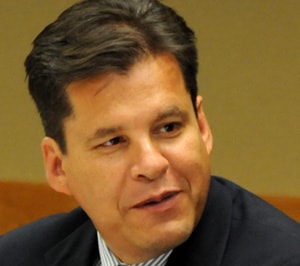
State Rep. Joseph Cervantes (Photo by Heath Haussamen)
AG has yet to act on nearly 100 cases filed under the Fraud Against Taxpayers Act
Attorney General Gary King has yet to act on nearly 100 cases filed under the state’s Fraud Against Taxpayers Act – and that could discourage potential whistleblowers from coming forward, the legislative sponsor of the law says.
State Rep. Joseph Cervantes, D-Las Cruces, says it’s time for the AG’s office to act on the cases it says it’s considering, either by moving forward with prosecution or a civil lawsuit, or by releasing them so civil attorneys representing the citizens who filed the lawsuits can proceed with them.
“This legislation was designed to encourage whistleblowers to come forward with knowledge of fraud and abuse, and unfortunately these delays send the wrong message to people trying to bring an end to these abuses,” Cervantes said.
The act, which Gov. Bill Richardson signed into law in 2007, protects those who sue the state in an attempt to expose government corruption. The law gained notoriety earlier this year when a whistleblower’s lawsuit against the state’s former state investment officer and members of Richardson’s administration was unsealed.
After being filed, cases like Frank Foy’s pay-to-play lawsuit remain sealed and are presented to the AG for prosecution or a civil lawsuit. If the agency declines to take action, the citizen can proceed on his own with a civil lawsuit – as Foy has done – and can be awarded between 15 and 30 percent of damages as compensation if he’s successful in his lawsuit.
Since the law took effect, the AG’s office has thus far released three cases – two filed by Foy and one filed by the National Education Association – allowing citizens to proceed with their own, unsealed lawsuits, Assistant Attorney General Nan Erdman wrote in response to a request filed under the Inspection of Public Records Act. But Erdman said the office is currently considering “not fewer than” 95 cases filed under the Fraud Against Taxpayers Act.
Cervantes says that’s way too many to be left in limbo.
“This landmark legislation was intended to be an aggressive tool for the attorney general’s office to recover potentially hundreds of millions of dollars in waste and fraud, “he said. “The Attorney General’s Office needs to either move on these cases or simply allow attorneys with the time and resources to do that job.”
King: Don’t assume the cases aren’t moving forward
King said in an interview that it’s not that simple. Though he can’t talk about specific cases because they remain under seal, he said Cervantes and others should not assume the cases aren’t moving forward.
“Just because it’s not obvious to the public or the Legislature what the progress is, it doesn’t mean progress isn’t being made,” he said.
King said there is a technical problem with the act that needs to be fixed. While laws like the Fraud Against Taxpayers Act in most other states only allow those with direct knowledge of the fraud to file a lawsuit, New Mexico’s does not. That has led to some “copycat” lawsuits filed by people whose only knowledge of a case may be what they’ve read in a newspaper, King said, and that can waste a great deal of time.
Cervantes proposed a fix to the law in the last legislative session, King said, but it died in a Senate committee.
In addition, King said, there are other considerations, including the quality of the attorney who files the lawsuit. King said his office has a duty to ensure the state will be well represented that he must consider before releasing a case to a civil attorney.
Most importantly, King said he needs additional resources. He asked the Legislature earlier this year for an additional full-time attorney who would work exclusively on Fraud Against Taxpayers Act cases. While the position was approved, it was not funded, which King said is the same as “not giving any help at all.”
Given the current budget crunch, King urged the Legislature to have the foresight to realize that investing in such a position would help the state recover much more money than the position costs.
“If you spend $100,000 or so helping us move these cases, we might bring millions of dollars in,” he said.
King said if the position isn’t funded in the upcoming legislative session, he will try to come up with “some creative ideas” for moving money around to allow a greater focus on these cases.
‘We still have lots of enthusiasm for these cases’
The AG’s office has 60 days under the act to decide whether to take a case or release it, but the AG can ask a court for an extension. Cervantes said he’s well aware that the AG doesn’t have the resources to take all of these cases, and that’s why he’d like to see the AG asking for fewer extensions and releasing more cases.
“The recognition that the attorney general doesn’t have the resources and the expertise in these areas is precisely why this legislation is important,” he said. “It allows attorneys who do have the resources and the expertise and the time to pursue these cases.”
King and Cervantes work together on a number of open government and corruption-related pieces of legislation, and King said he understands Cervantes’ frustration.
“Frankly, I have been very noisy to the Legislature for about the last 18 months about things we needed to do so we can move these things along quicker, and I think Rep. Cervantes has been sympathetic to that, but we’ve had a hard time getting others to be sympathetic,” he said. “We still have lots of enthusiasm for these cases.”
